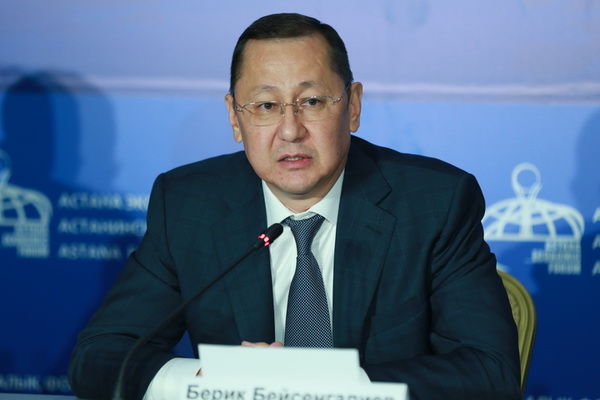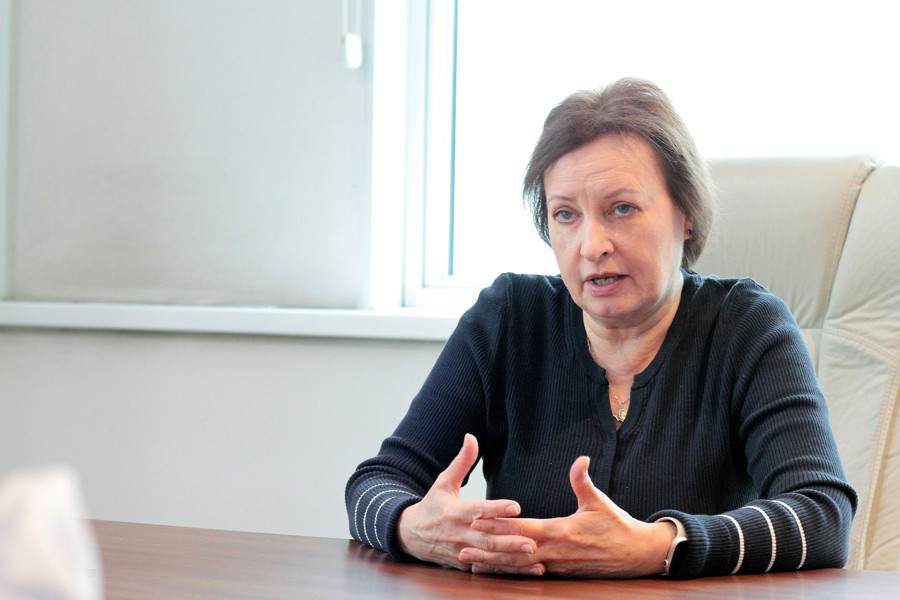Managing Director for Asset Optimization of JSC Samruk-Kazyna Berik BEISENGALIYEV:
WE EXPECT THAT INTERNATIONAL CORPORATIONS ARE WILLING TO INCREASE THEIR STAKES IN JVs WITH THE FUND'S SUBSIDIARIES

In the next five years National Wellbeing Fund Samruk-Kazyna plans to spin off 217 companies into privatization. At the same time the fund will keep control over its strategic assets. Managing Director for Asset Optimization - member of the Board - of JSC Samruk-Kazyna Berik BEISENGALIYEV told in an interview with Interfax-Kazakhstan on how the process of putting up companies for sale is going and how decisions on the sale of large assets will be taken.
- How much money does the fund plan to earn from the assets privatization?
- It's important to take into consideration several nuances hereto. Firstly, the quantity of assets is very big, secondly, privatization will last quite long - for five years. The assets market value will depend on the market conditions. Oil companies are an obvious example, the value of which may essentially fluctuate depending on the market prices for hydrocarbons. We cannot forecast these prices for 2018-19. No less essential changes may happen in the energy sector, hier in the first instance the sector regulation will have an impact. For example, if electiricity tariffs change the asset market may aslo be revised upwards or downwards. That's why today forecasting the ultimate market value of all assets is very tricky. We can now talk only about the book value of stakes we own in these assets. To date the value of these stakes amounts to 2 to 4 trillion tenge (333.97 tenge/$1). This is the balance book of all assets of the Group of JSC Samruk-Kazyna, which we are going to privatize whereas, of course, we expect the earnings from the sale of assets to exceed their book value. However, in addition to the financial results, which we expect to achieve, the national interests in the filed of the long term economic development are no less important to us. Privatization must also result in structural ecenomic gains for the state. We should have to take this into consideation if for this purpose, for example, it would be more profitable to place assets not outside the country but on Kazakhstan's platform or to reconstructure a monopoly player or, finally, to keep strategic control over sensitive assets. We will also pay attention to the social aspect. So, when selling big assets we will undoubtedly conclude investment contracts with investors where we will stipulate terms such as the job preservation, profit reinvestment into asset modernization, company profie preservation and so on. However at the same time we want to provide an opportunity for an investor to get relevant return on his capital. These issues are also taken into consideration and all that will be set out in investment contracts. We must keep balance so that an investor has an interest and at the same time the state intertests are secured.
- Thus, are there assets that will be fully spun off and assets where the state intends to hold strategic stakes?
- Yes. Our assets were initially split into two lists. The first list includes 44 major assets having strategic importance or essential impact on the economy while the second list is made up of 173 medium sized or small assets which are of no such socio-economic importance. By and large, these are medium sized or small businesses. We will sell the assets from the second list quite swiftly and mainly through e-auctions. As far as the first list is concerned comprehensive scrutiny is a priority for us rather than the speedy sale. The lengthy preparatory period is possible and already taking into consideration the asset peculiarities we will opt for the way of selling.
- What ways of selling are under scrutiny?
- The ways are various: an IPO, a direct target sale to a strategic investor, a two-stage content, public-private partnership various forms, e-auctions.
- How many assets do you plan to spin off for privatization this year?
- This year we will spin off for privatization only medium sized and small companies from the second list. Their sale has already kicked off and we plan to finalize it by the end of 2017. This is more than 173 companies which will be privatized or if there is no economic viability they will be lquidated or transformed. This year selected companies from the first list - the most mature for privatization - will be also put up for sale.
- On what basis will decisions on the company liquidation be made?
- There are companies which are idle. At one time they were created, for example, for implemetnation of some specific projects etc. They are already finished. There are some service companies which are no longer needed. If a company is not viable, has no prospects for development and does not involve any social aspect why should they be maintained? They need to be liquidated.
- Which companies, for example?
- All of the companies differ and the Fund's privatization project office is conductiing a thorough analysis on each of them, offers various decisions. Thereafter this decision would be agreed with the state commission for the economic modernization chaired by Kazakhstan's prime minister. Only after that it would be possible to talk about concrete companies.
- Do you consider that that the current crisis can affect the Fund's plans for its subsidiaries’ IPOs?
- International practice shows that the presale preparatory period takes an average of 9 months to 2 years. During this period a company passes through the tremendous pre-IPO process that is it improves corporate governance, brings financial statements, business activity into conformity with international standards, etc. Provisionally we expect to make public offerings from 2018 through 2020. We have almost 2 years for arrangements. Undoubtedly overseas consultants will be involved who will oversee these deals. The presale period is a priority task for us. We have not yet determined which companies will go public on the exchange in the first instance, which ones will go later on - this work is under way.
- Have investors already shown interest in any of the listed assets?
- Yes, of course. Investors from both the US and Europe, the Middle East, South East Asia are interested. But we think that in the first instance those companies which are already operating in Kazakhstan will be interested in acquiring our stakes. As you know we spin off stakes in JVs for privatization with our current partners, for example, GeneralElectric, Talgo, other leading international corporations. We expect many of them to want to increase their stakes in the JVs.
- Recently in one of the interviews you said that during privatization AirAstana Kazakhstan intends to hold its 51% stake in the company. Currently the Fund owns 51% , BAE Systems 49%. So, do BAE Systems intend to pull out of AirAstana or sell part of its stake to the Fund?
- At present we have no information about the plans of BAE Systems regarding its stake in Air Astana. Samruk-Kazyna will sell part of its stake and we are considering several means of company sales including IPO, but according to intergovernmental agreements majority stake shall be owned by Kazakhs. We are in the initial preparatory phase and it is too early to announce any decisions.
We definitely plan to discuss the opportunities and ways for BAE to sell part of its stake as well, but in the end it is going to be their decision and it wouldn't be right for us to speculate – they should be the ones commenting on this..
- What companies have already shown interest?
- For now it's too early to talk about that. The preparatory stage is under way. This is a serious and lengthy process. So, each and all of the companies will be assessed by an outsourced independent assessor. In addition, independent consultants would be outsourced for [dealing with] assets with a book value of over 2.5 million monthly calculated rates - more than 5 billion tenge. We would coach companies, research the market, look for strategic partners, draft proposals on privatization together with consultants. The company in question would examine these proposals, it has the authorized bodies: board and board of directors. Thereafter proposals would be handed over to the sectoral commission set up at our subsidiaries. If everything was approved then proposals would be submitted to the Fund, which, as I said earlier, set up the project office involving international consultants such as BCG. The project office would put together proposals from all of the subsidiaries. All these proposals would be submitted to the state commission for the economic modernization chaired by the prime minister. If all the parties involved had a clear understanding of how this asset would be spun off then it would be sold further. This decision-making level maintains complete transparency and fairness of the decision-making [process].
- It was said initially that no more than 25% of the company shares would be offered during IPOs. May the stake be less?
- On the average, stakes to be offered for IPO on strategic assets are around the level of 25%. It may be slightly less or more. But control over strategic assets will be left with the state. We will have ultimate stakes approved by consultants and authorized bodies. There will be some understanding by the autumn of which assets we will offer for IPO in the first instance in 2018.
At the same time taking into account national interests we consider International Financial Center Astana to be a priority platform. It's understandable that it would be much easier for us to make IPOs on the London Stock Exchange or in Hon Kong. Procedures there are practiced and understandable, investors are well aware of these platforms. But in order to develop our national platform and securities market inside Kazakhstan we need to do what we can in terms of helping International Financial Center Astana. We set the national interests over those exclusively financial benefits, which the Fund could have enjoyed, for example, entering the London Stock Exchange.
The priority of national interests is cemented in the ideology of the Fund's Privatization Program, which we approved during the meeting of the Board of Directors of Samruk-Kazyna and during the meeting of the state commission for the economic modernization chaired by Kazakhstan's prime minister. In line with this ideology we also provide equal access for all investors not only for local ones. For example, Russia, China restricted overseas investors. We are talking about equal access both for Kazakhstani investors and international investors. However at the same time if, for example, a local investor and an overseas investor make absolutely similar offers then, for sure, priority will be given to a local investor, or to a JV involving the Kazakh side.
The involvement of international investors is also very important for the development of Kazakhstan's economy. This is not only money but people, technologies, innovations.
- Analysts consider it inexpedient to carry out KazMunayGas’ IPO given that JSC KazMunayGaz Exploration Production's shares remain on the market. To this end, is the delisting of its shares planned from the London Stock Exchange?
- International practice shows that very many companies go public owning stakes in listed companies which are currently traded. So the lising or de-listing of KazMunayGaz Exploration Production's [shares] does not hinder KazMunayGas’ IPO. It is able to go public in this capacity and able to do so after de-listing.
- Thank you for the interview!
June, 2016
© 2026 Interfax-Kazakhstan news agency
Copying and use of these materials without reference to the source is prohibited
Archive





